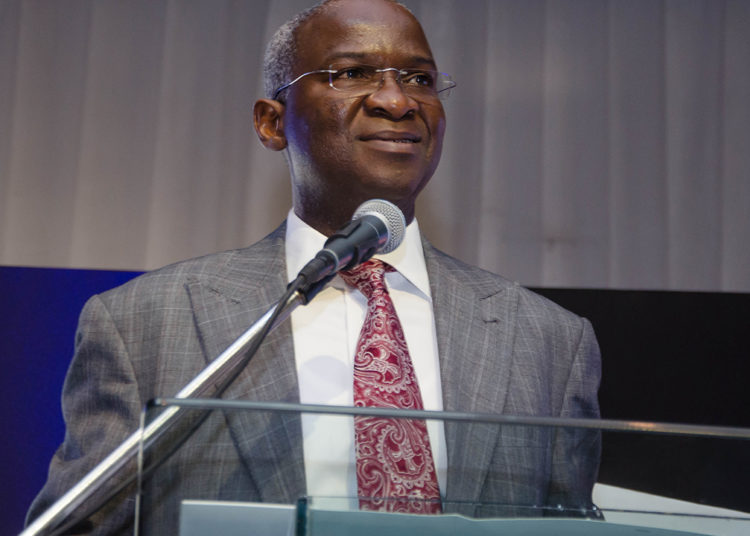Minister of works and housing, Mr Babatunde Fashola yesterday disclosed that the federal government is owing highway contractors about N10.4 trillion for different road construction projects.
Fashola made the disclosure at a budget defence with the House of Representatives committee on works.
The minister also said that shortage of young engineers and technical officers due to the embargo placed on employment by the government was adversely affecting the Federal Ministry of Works and Housing.
Fashola explained that shortage of younger engineers/technical officers in the ministry as a result of embargo on employment is affecting proficient project supervision at the sites.
“It is expected that more sources of funding of highway projects be explored as well as lifting the embargo on employment of needed engineers/technical officers at middle level to enhance supervision of projects.
“The main challenge to highways development in the country remains Inadequate funding. As at date, the government is committed to highway contractors to the tune of about N10.4trillion while a total of about N765billion are unpaid certificates for executed works,” he said.
The minister further explained that “As at October 2022, the ministry had a cumulative unpaid certificate in the sum of N765,017,139,752.92 for ongoing highway and bridge projects. Apart from the pressure of resources to pay, there is the inadequacy of annual budget provisions where N100m or N200m was provided for roads costing twenty or more billion.
“In spite of all odds, twenty (20) major highways projects have so far been completed in 2022 and are ready for commissioning. The total cost of the completed projects is in the sum of N444,322,123,808.61 and they cover a total length of 379.677km. Additionally, there are fifty-nine(59) major highways/bridges priority projects that are at an advanced level, to be completed within 2022-2023 with a total contract sum of N60,961,187,130.71.”
According to him, the ministry is currently undertaking a total of 1,642 highway contracts at a total contract sum of N 10,395,294,937,624.20 spread over the six geo-political zones explaining that the 1,642 ongoing contracts are categorised according to special funding mechanisms.
“A total of six selected critical projects are being funded under the 2022 PIDF Project, which is managed by the Nigerian Sovereign Investment Authority (NSIA). As at date, the total sum of N754,790,502,612.80 has been certified out of the sum of N1,314,753,921,766.72. This translates to a performance of 57.41 per cent.
“A total of 71 selected critical projects are being funded under the 2021 Sovereign Sukuk Issuance, which is managed by the Debt Management Office (DMO). As at date, the total sum of N157,920,183,472.88 has been drawn out of the sum of N210,565,000,000.00. This translates to a performance of 75 per cent.
“The NNPC joined the Road Infrastructure Development & Refurbishment Tax Credit Scheme programme by undertaking to finance 21 roads in the total sum of N621bn with a total length of 1,804.6km. These roads were identified by key stakeholders such as the NNPC, Petroleum Tanker Drivers Association (PTDA) and the ministry, etc as being crucial for the efficient distribution of petroleum products across the nation.
“As at date, the sum of N196,052,918,202.51 has been paid by the NNPC out of the Federal Executive Council (FEC) approved sum of N621,237,164,794.59 representing 31.5 per cent performance”.
The minister, however, noted that for 2023, particular attention has been paid to ongoing road projects that are on the nation’s major arterials but not having any alternative source of funding apart from the budget. These include the llorin -Kabba -Obajana road, Okene -Itobe road and dualisation of Ibadan (May Fair Junction)-Lagere-Iremo-Erinwu-Ilesha road.
He also disclosed that the completion of ongoing highway bridges has been prioritised in the 2023 budget, particularly the Murtala Mohammed Bridge, Nupeku Bridge and Marine Bridge, Eko Bridge.





